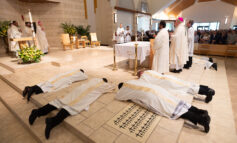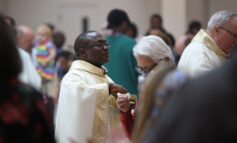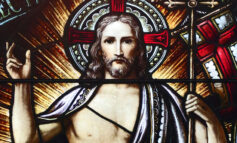
Bishop Edward J. Burns greets students after a celebration of Mass at Mary Immaculate Catholic Church, marking the 60th anniversary of Mary Immaculate Catholic School in Farmers Branch on Aug. 30. (Jenna Teter/Special Contributor)
By Father Thomas Esposito
Special to The Texas Catholic
Is friendship with God possible? The question might appear awkward, ideally reserved for those impractical philosopher types who muse leisurely on the mysteries of the universe. But everyone can and should reflect on such a question, because its answer underlines some fascinating truths about our marvelous yet undeserved access to our Lord.
Aristotle’s word on the matter is quite simple: God is so radically and infinitely superior to puny mortals, and has absolutely nothing in common with our finite selves, that friendship is not possible. The Bible echoes the view taken by Aristotle in several places (see, for example, Psalm 139, Job, and Ecclesiastes), but also contains a rich treasury of insights regarding the real possibility of God deigning to befriend us, much like a king freely extending his hand to a pauper with a genuine desire to share his regal life in some way.
Moses, we are told in Exodus 33:11, frequently speaks with the Lord “face to face, as one man speaks to another.” Yet just a few verses after this mysterious statement, Moses requests to see the Lord’s glory, and the Lord replies, “But my face you cannot see, for no one looks upon me and lives” (Exodus 33:20). What are we to make of this apparent contradiction? According to St. Gregory of Nyssa in his beautiful Life of Moses, this passage teaches us that our sight can never rest fully on the divine presence; rather, the vision of God is a matter of falling ever deeper in love with the infinite God: “God would not have shown Himself to [Moses] if the sight were such as to bring the desire of the beholder to an end, since the true sight of God consists in this: that the one who looks up to God never ceases in that desire.”
The privilege of accepting the friendship of God, in other words, implies that we will always yearn to drink from the nourishing spring that we can never exhaust. In fact, friendship with God implies a relentless attraction, an endless pursuit on our part that never ultimately allows us to grasp the ever-elusive God. But it is precisely in this awareness of God’s utter transcendence that we perceive the radical gift of love offered to us in the revelation of the Son of God. While Jesus Christ, the perfect expression of God’s love, refers to his disciples as friends (John 15:15), he also notes what is required for us to share in that love, that friendship bonding us to him and, by extension, to the Father: the imitation of his own love even unto death. “Unless a grain of wheat falls to the ground and dies,” he observes, “it remains a grain of wheat; but if it dies, it bears much fruit” (John 12:24).
The immensity of the divine love poured out by Christ on the cross reflects the immensity of the gift: our friendship with God is founded on our privileged status as sons and daughters, “joint heirs,” as St. Paul puts it, with Christ the ever-living Son (Romans 8:14-17). We even dare to say, again with St. Paul, that we are members of Christ’s body (1 Cor 12:12-27), making our earthly bodies the dwelling place of the Holy Spirit (1 Cor 6:19-20). That filial relationship to God is expressed in the hierarchy of love by which we live – proper love of ourselves, our neighbor, and our God. The friendship we gain as adopted children of our heavenly Father in no way diminishes the infinite mystery that separates us from the inscrutable God. On the contrary, the revelation of Christ bridges that awesome gap, and allows us to see the Father in a way that Aristotle and even Moses never did: it permits us to look upon the face of the elusive God in the person of Christ our brother. We therefore utter the lines of Psalm 27 with our own self-reflection, the appealing eyes of our neighbor, and the silent Lord who meets us in the Eucharist all before us: “Your face, O Lord, I seek; hide not your face from me.”
Father Thomas Esposito, O.Cist., is a theologian and monk at the Cistercian Abbey of Our Lady of Dallas in Irving. His column appears occasionally in The Texas Catholic.



